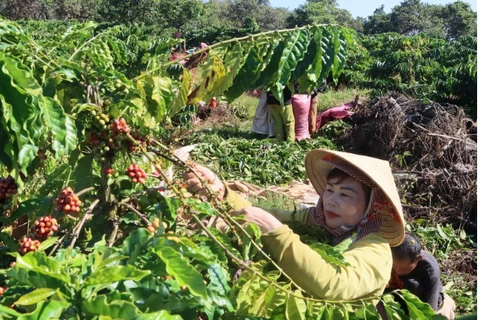Hanoi (VNA) – Vietnam’s coffee exports in 2023 are expected to break the record of 4 billion USD in export value set in the previous year.
According to the Ministry of Agriculture and Rural Development, the country shipped 1.36 million tonnes of coffee abroad, earning nearly 3.5 billion USD.
Vietnam entered the new 2023-2024 coffee crop which began in October, when the export price reached a record high, at 3,603 USD per tonne, up 8.9% month-on-month, and 40.7% year-on-year.
With over 710,000 hectares, Vietnam ranks sixth in the world in terms of coffee farming area, but has the second biggest output thanks to high yields (1.75-1.85 million tonnes).
However, out of the total area, only 185,000 hectares have received sustainable production certificates of different kinds.
Experts advised localities to expand such kind of area to meet strict requirement of international markets.
At present, the EU is Vietnam’s biggest coffee importer, followed by the US and Japan. Although coffee exports to China do not account for a high proportion, many Vietnamese businesses are paying much attention to this market which has an average increase of more than 25% per year in imports.
However, this is also a highly competitive market, requiring businesses to invest in diversifying specialty coffee products and processed coffee, and to meet strict quality standards.
Coffee market expert Nguyen Quang Binh analysed that currently, major markets such as the EU and the US are changing their consumption demand from importing coffee beans to processed coffee. Therefore, Vietnam must also prioritise investment in deep processing facilities to increase the value of coffee products and aim for sustainable development./.
According to the Ministry of Agriculture and Rural Development, the country shipped 1.36 million tonnes of coffee abroad, earning nearly 3.5 billion USD.
Vietnam entered the new 2023-2024 coffee crop which began in October, when the export price reached a record high, at 3,603 USD per tonne, up 8.9% month-on-month, and 40.7% year-on-year.
With over 710,000 hectares, Vietnam ranks sixth in the world in terms of coffee farming area, but has the second biggest output thanks to high yields (1.75-1.85 million tonnes).
However, out of the total area, only 185,000 hectares have received sustainable production certificates of different kinds.
Experts advised localities to expand such kind of area to meet strict requirement of international markets.
At present, the EU is Vietnam’s biggest coffee importer, followed by the US and Japan. Although coffee exports to China do not account for a high proportion, many Vietnamese businesses are paying much attention to this market which has an average increase of more than 25% per year in imports.
However, this is also a highly competitive market, requiring businesses to invest in diversifying specialty coffee products and processed coffee, and to meet strict quality standards.
Coffee market expert Nguyen Quang Binh analysed that currently, major markets such as the EU and the US are changing their consumption demand from importing coffee beans to processed coffee. Therefore, Vietnam must also prioritise investment in deep processing facilities to increase the value of coffee products and aim for sustainable development./.
VNA

























